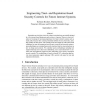Free Online Productivity Tools
i2Speak
i2Symbol
i2OCR
iTex2Img
iWeb2Print
iWeb2Shot
i2Type
iPdf2Split
iPdf2Merge
i2Bopomofo
i2Arabic
i2Style
i2Image
i2PDF
iLatex2Rtf
Sci2ools
SAC
2015
ACM
2015
ACM
Engineering trust- and reputation-based security controls for future internet systems
Reputation as a decision criteria for whom to trust has been successfully adopted by a few internet-based businesses such as ebay or Amazon. Moreover, trust evaluation is becoming of increasing importance for future internet systems such as smart grids, because these contain potentially millions of users, their data, and a huge number of subsystems. The resulting scale and complexity makes them ideal candidates for trust and reputation based security controls, but currently engineering methodologies are missing that provide structured step-by-step instructions on how to design such controls. We contribute such a methodology including tool support that helps (i) to elicit trust relationships, (ii) to reason about how to construct trust and reputation engines for these and finally (iii) to specify consequent security controls. The methodology is based on formal OCL-expressions that provide (semi-)automatic support analysing UML models with regard to trust and reputation information.
| Added | 17 Apr 2016 |
| Updated | 17 Apr 2016 |
| Type | Journal |
| Year | 2015 |
| Where | SAC |
| Authors | Kristian Beckers, Maritta Heisel, Francisco Moyano, M. Carmen Fernández Gago |
Comments (0)

